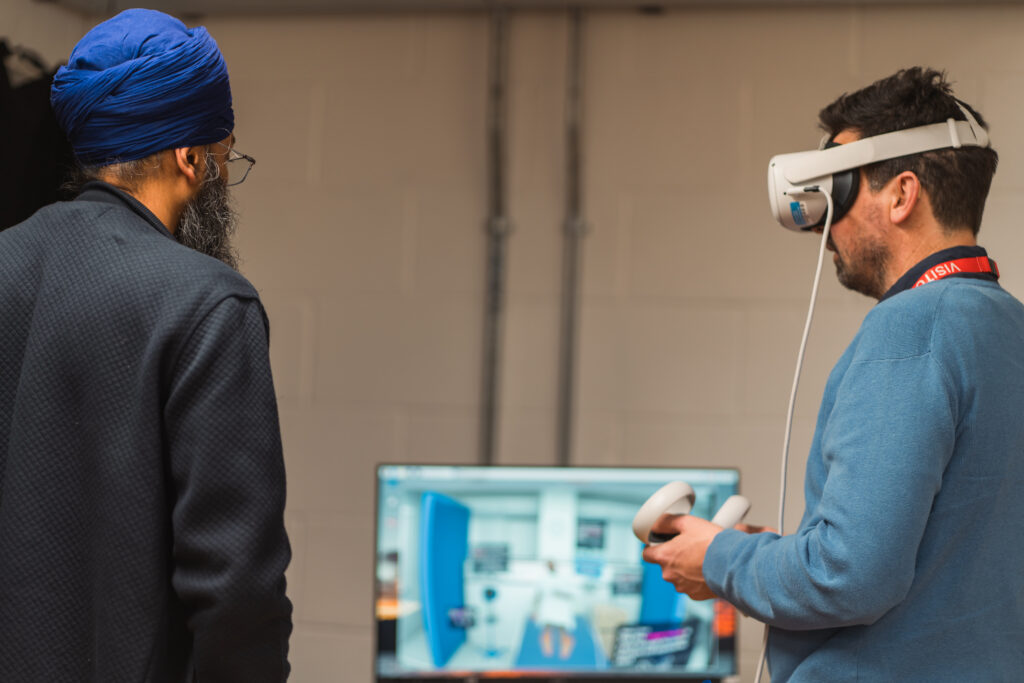Ground-breaking technology aims to improve staff recruitment and retention in the social care sector
A class of Calderdale College students have co-developed a range of unique virtual reality (VR) prototypes with a specialist tech company in a bid to improve staff recruitment and retention in the social care sector by changing the way learning is assessed.
Funded by the NCFE Assessment Innovation Fund, this ground-breaking pilot is part of a project to design and test the use of immersive technologies as an assessment tool in Further Education.
On Tuesday 4 April, representatives from NHS England, University of Huddersfield, University of Leeds and Huddersfield and the Calderdale & Huddersfield NHS Foundation Trust, tested the prototype that has been co-developed by Digital students at Calderdale College which demonstrates real-life situations and practices found in social care environments.
The VR scenario will include one of the 12 Care Certificate Standards needed in health and social care, which is currently only delivered by employers when a support worker enters the industry. The project is exploring how giving colleges the chance to train students in the Care Certificate Standard could improve staff recruitment and retention in the sector, and ease the strain on employers.

Due to health and safety and other constraints, students are currently restricted from undertaking tasks in a care home setting. So, by exposing them to real world situations during their course through VR, they will be more confident in their decision to enter the sector before leaving college, improving their chances of staying in the industry.
The prototypes will be developed into a final product and used by the College’s Health T Level students, helping them gain the skills and experience before they leave for employment.
Karl Veltman, Deputy Principal at Calderdale College, commented on the development of the project: “This has been a fantastic project, the first of its kind in Further Education, developing virtual reality as an assessment tool within the social care sector and within our social care curriculum.
“Working with our key strategic partners has allowed our staff and students to innovate and develop new skills. We’re delighted to be one of the first providers to use virtual reality in teaching and learning for assessment purposes.”
The students have developed and designed the VR scenario in collaboration with Taran3D, a tech and Unity Specialist that create VR training simulations. Taran Singh, Founder and CEO, has worked closely with the students to build the prototypes that were tested at the event.
Taran added: “It’s been really interesting working with the students and seeing how quickly they’ve picked up VR and immersive applications. It’s been very rewarding seeing their enthusiasm for the technology and we’ve been able to give them expert advice to build their VR application.
“The T Level course has helped the students to focus their expertise and understand how VR and gaming technologies can be used in different industries. This is a very powerful application of immersive technologies in the education sector.”
Ann Sunderland, RN|BSc (Hons)|MMedSci|SFHEA, Consultant in Clinical Skills and Simulation, has been heavily involved in designing the scenario, outlining the learning outcomes and how the scoring system may be used as an assessment method.
Ann commented: “Calderdale College are the forerunners of what the future is going to look like and they’ve been brave enough to take the first step into this realm.”
To find out more about the project, visit: www.www.calderdale.ac.uk/calderdale-college-first-to-deliver-virtual-reality-social-care-curriculum/






